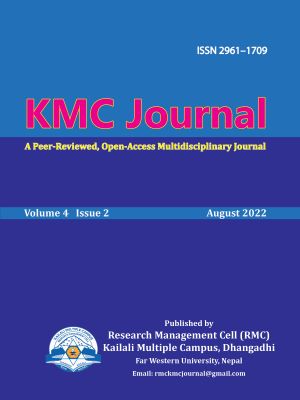Junk Food Consumption Practices among the College Students in Banke District
DOI:
https://doi.org/10.3126/kmcj.v4i2.47778Keywords:
food habit, health, nutritional value, busy lifestyles, obesityAbstract
Junk foods are easy to prepare and take but have low nutritional value and contain only fat, high sugar, salt, calories, and colours which adversely affect the health of college students. The objective of this study was to assess the junk food consumption practice and its causes and study the relationship between socio-demographic factors and frequency of junk food consumption among college students. This study utilized a cross-sectional research design under quantitative research. Three hundred and fifty-four students were selected by using the multistage sampling method. A set of questionnaire was used to collect the required data. The collected data were entered and analyzed in SPSS version 20 using simple statistical methods including univariate and bivariate analysis. This study found that all of the respondents consumed junk food, among them 33.1 percent of the respondents consumed doughnuts, 40.1 percent of the respondents consumed chat-pat, 37.9 percent of the respondent consumed pani-puri, 39.0 percent of the respondents consumed noodles, 22.31 percent of the respondents consumed chocolates. Likewise, 60.7percent of the respondents consumed junk food in the afternoon and least (2.8%) of the respondents consumed junk food at night. Similarly, 30.2 percent of the respondents consumed junk food three times a day and 12.4 percent of the respondents consumed twice a day. Likewise, this study also found that there is no relationship between socio-demographic factors (age, gender, religion, fathers’ education, mothers’ education, fathers’ occupation, mothers’ occupation) and frequency of junk food consumption among college students. Furthermore, this study found that the main reason of taking junk food is it being easy to make and influence of advertisements, save time, and its taste. Therefore, this study suggests conducting junk food related health awareness programmes for college students.
Downloads
Downloads
Published
How to Cite
Issue
Section
License
Copyright (c) 2022 Bhagawoti Sharma

This work is licensed under a Creative Commons Attribution-NonCommercial 4.0 International License.
This license allows reusers to distribute, remix, adapt, and build upon the material in any medium or format for noncommercial purposes only, and only so long as attribution is given to the creator.




